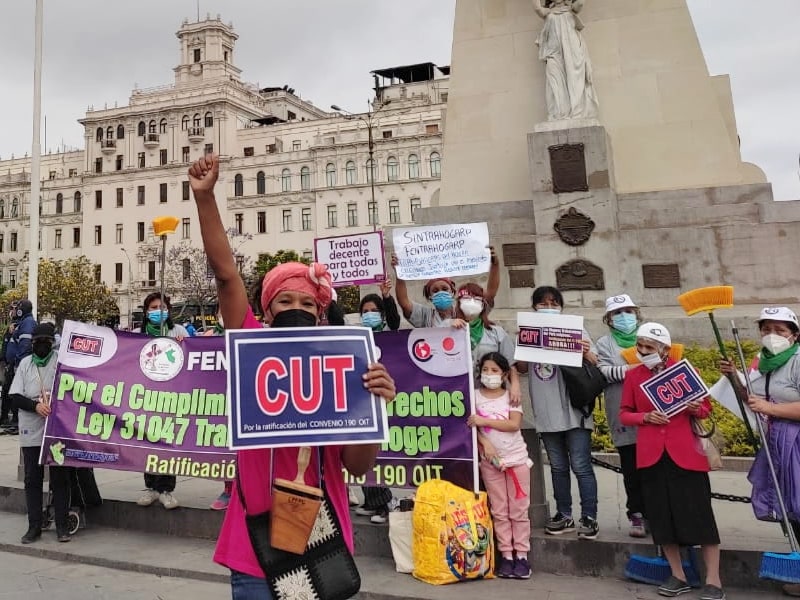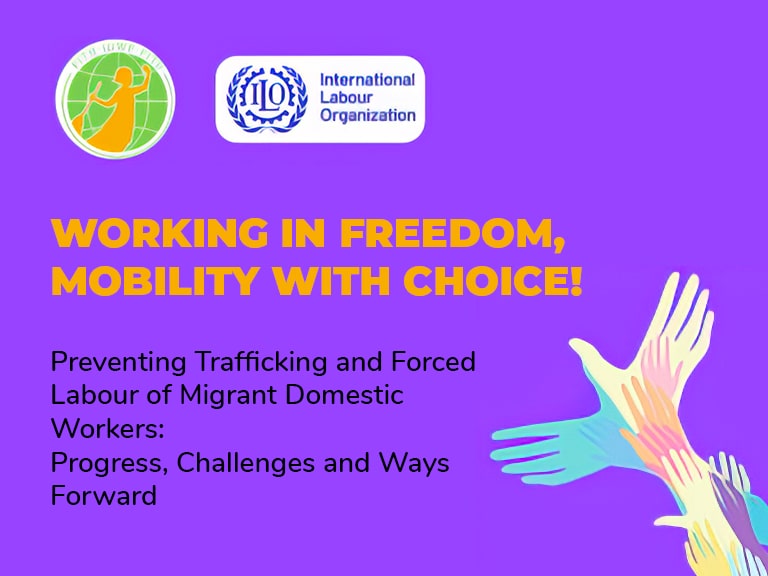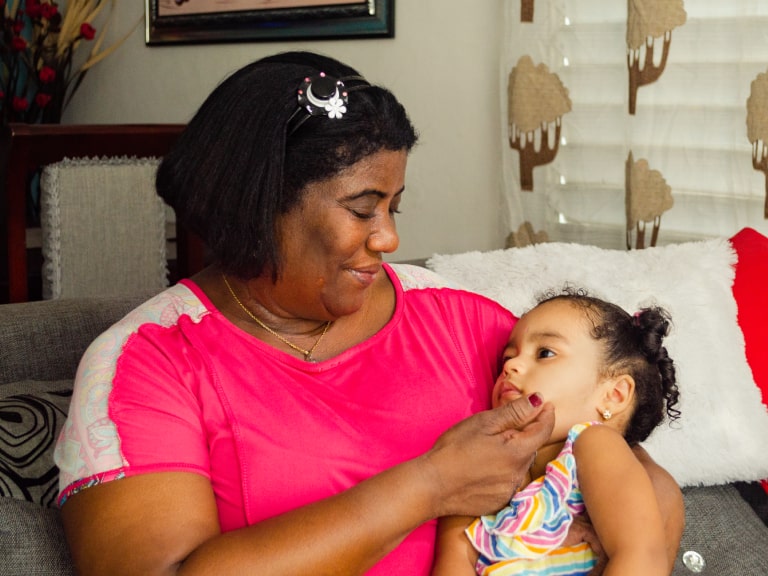- This event has passed.
Let’s Talk about Resilience – The Pandemic and Domestic Workers in Latin America and the Caribbean
The Covid-19 crisis has shown the terrible lack of protection that domestic workers in Latin America and the Caribbean suffer, but it has also shown that without them, our societies collapse. There is only one way to repair such a contradiction: the Latin American states need to recognize domestic work as work and guarantee it is carried out in decent conditions, equal to those of other salaried sectors.
Details
Latin America –
by Fernanda Valienti | Mar 24, 2022
ReVista, the Harvard Review of Latin America, Winter 2022
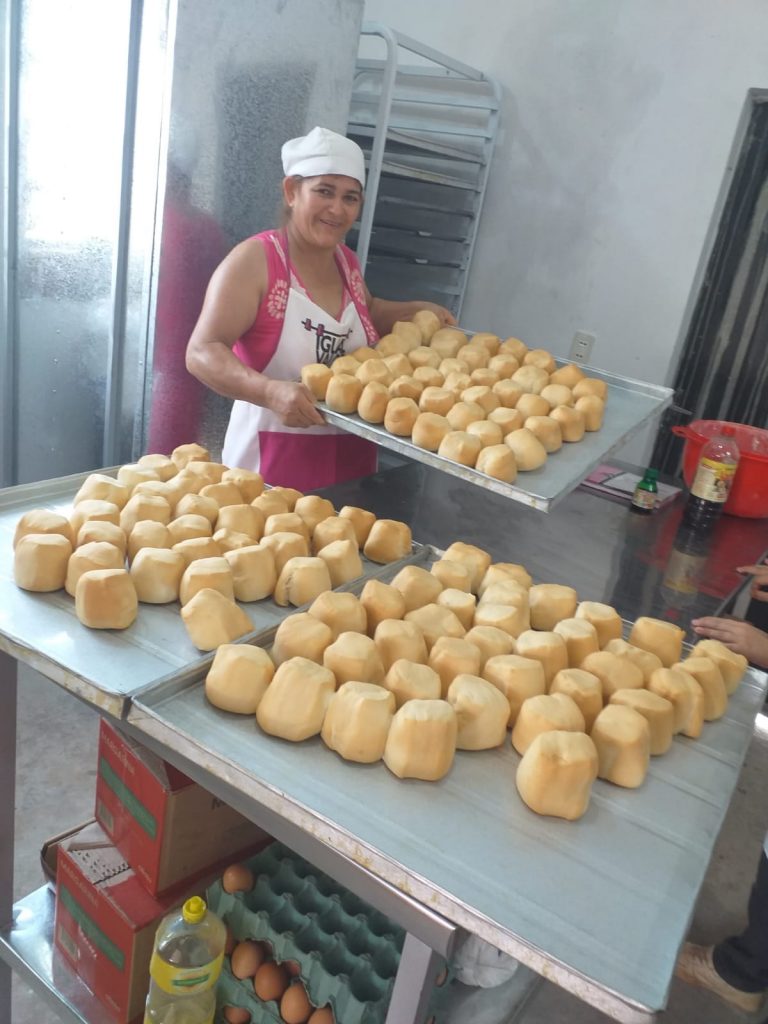
SINTRADI, of Paraguay, launched a bakery to generate incomes and jobs for the workers most impacted by the pandemic. (Photo Courtesy: SINTRADI)
When I joined the International Domestic Workers Federation (IDWF) family in October 2019, I never imagined that a few months later I would experience both the pain and the privilege—the ironies of life—of seeing the regional movement of domestic workers fighting one of the toughest battles in their history, the one caused by the Covid-19 crisis, and coming out of it stronger.
In the last two years, I have witnessed how domestic workers’ labor and human rights in my beloved region were violated in every possible way. I have seen a painful display of callousness on the part of employers and governments. I have seen social injustice at its best: the women most exposed to the health and economic crisis have also been the most forgotten and least favored.
However, in these times, I have also understood the meaning of two terms that are talked about a lot but are not always fully characterized: resilience and empowerment. Far from being intimidated by the adverse reality, the leaders of the region’s union organizations of domestic workers knew how to capitalize on this unprecedented crisis, reclaiming their demands, making their rights visible and advocating for their appeals to be included in public agendas. And all with exceptional creativity and a strategic vision that entrepreneurs would envy. These wise women saw opportunity where others saw desolation. These enlightened lionesses reinvented themselves in record time and thus reaped unimaginable victories amid the storm. That is why I can proudly say that I have had the “privilege” of going through the Covid-19 crisis with domestic workers in Latin America and the Caribbean. Today I want to share with the world this experience that changed me forever.
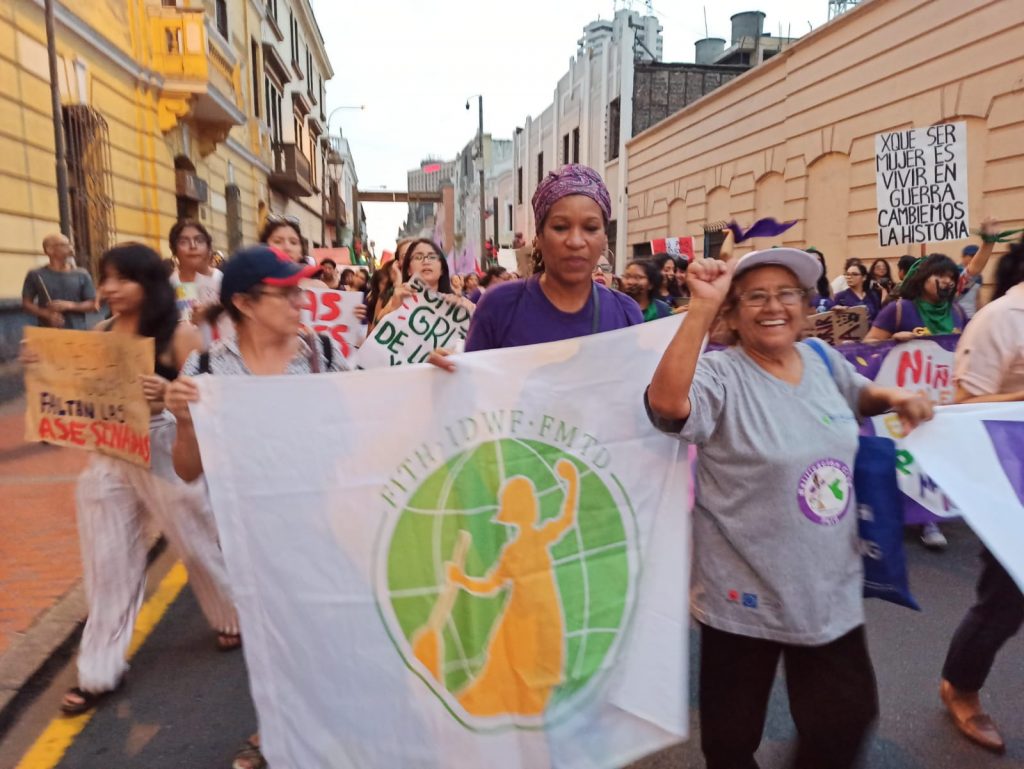
Peruvian domestic workers celebrate a historic victory: the passing of a law which grants them the same rights as formal-sector worker. (Photo Courtesy: FENTRAHOGARP)
What the Pandemic Left Us
More than 15 million people are engaged in domestic work in the region, according to the latest data from the International Labor Organization (ILO, 2021), in Latin America and the Caribbean. Of these, 92% are women, and 72.3% provide their services without a formal contract. In addition, their salaries do not reach half of what other salaried workers receive. These figures show a brutal contradiction between regulations and practice, considering that, of the 35 countries that have ratified ILO Convention 189 on decent work for the sector worldwide, 18 belong to the region.
In this context, Latin American and Caribbean domestic workers have been the most affected by the Covid-19 pandemic in terms of job losses, reduced working hours and decreased income because many employers did not want to risk contagion by having someone come in from outside. As of the second half of 2020, about half of them had lost their source of income, and only 9.8% were fully covered by social security (ILO, 2021), which means they had limited access to health services. In some countries, the effects of the pandemic were particularly devastating during that period: in Peru, 72.1% of domestic workers lost their jobs; in Ecuador, 53.3%; and in Colombia, 50.6%.
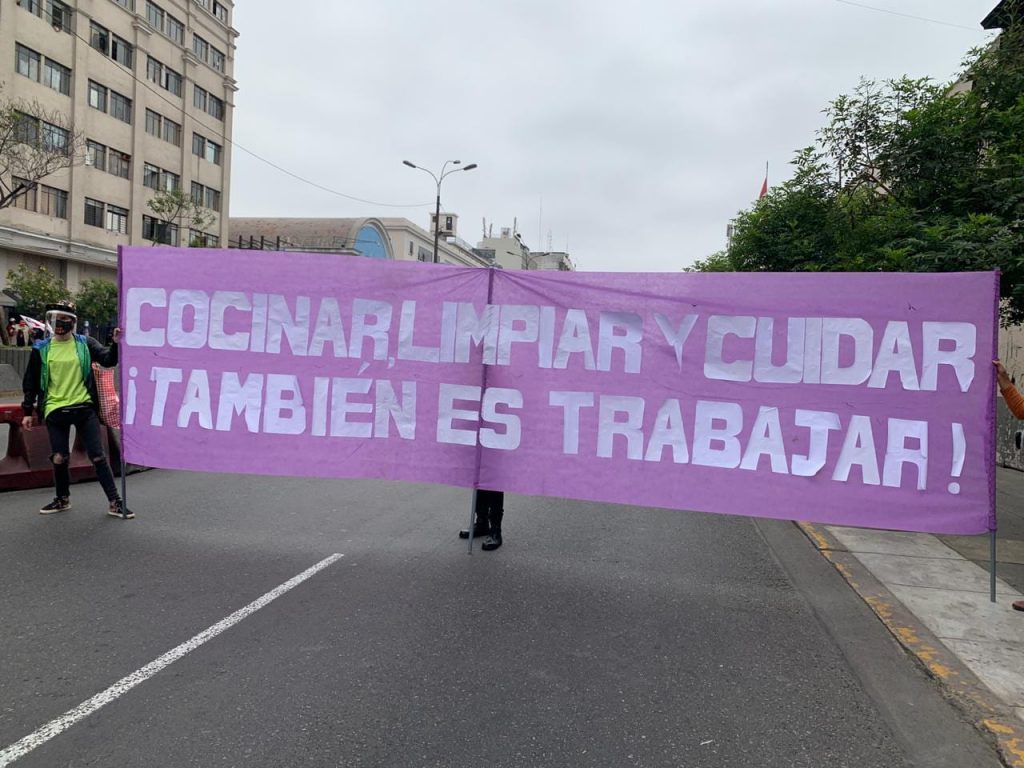
Peruvian domestic workers take to the street to advocate the importance of recognizing domestic work as actual work, just like any other profession. (Cortesía de SINTTRAHOL)
The results of a survey promoted by the IDWF (2020) add that 14.2% of them kept their jobs, but with worsened working conditions. Meanwhile, 23.1% continued to work, translating into greater exposure to the virus. Only 13.8% of the workers consulted reported that their employers respected their right to paid quarantine. It should be noted that 92% of those surveyed indicated that domestic work was their only or primary source of income. In addition, 68% of them represented the only monetary contribution to the family economy.
As we can see, the lack of protection and informality that characterize the sector has manifested in various ways in the face of the Covid-19 crisis. Given that most domestic workers do not have a written employment contract or are registered with social security, many employers interrupted the employment relationship during the pandemic without recognizing any rights and without paying their wages. But those who kept their jobs often suffered abuses of all kinds. The confinement of entire families in homes implied a greater demand for cleaning and care services. Hence, many domestic workers have been forced to remain in their workplaces during mandatory isolation, resulting in an overload of tasks, longer hours, lack of adequate rest, inability to see their own families, greater exposure to the coronavirus and a high probability of suffering the psychosocial effects derived from such a stressful situation.
On the other hand, few domestic workers in the region were able to access the assistance mechanisms provided by the governments: barely 40%, according to the IDWF survey. This is both because of their situation of labor informality (most of these measures were aimed at registered workers) and the difficult online procedures required to apply for these benefits.
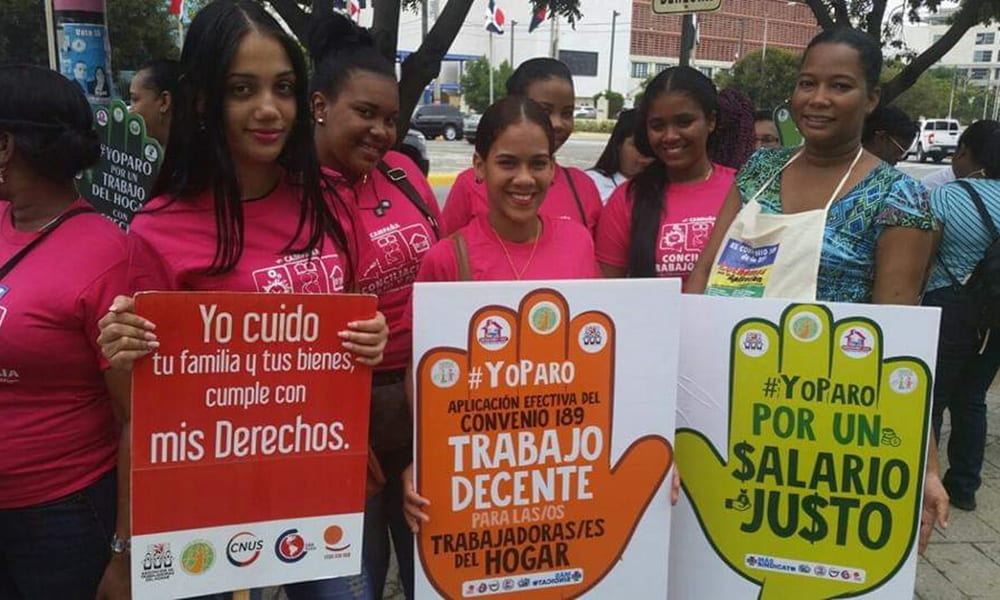
Organizations of Dominican domestic workers march to demand their rights be respected during the pandemic. (Photo Courtesy: ATH)
The effects of the pandemic have been particularly devastating for women workers belonging to less favored social groups. It is no coincidence that the first fatal victim of Covid-19 in Brazil was a 63-year-old Black domestic worker with diabetes who was infected by her employer when she returned to Rio de Janeiro from a trip to Italy. But the peak of the horror came on June 2, 2020, in the city of Recife (Pernambuco, Brazil), with the death of Miguel Santana, the five-year-old son of an Afro-descendant domestic worker whose right to paid quarantine was not respected by her employer. Given the suspension of school classes, Mirtes Santana was forced to take her child to work and leave him momentarily with her employer while she walked the family dog (a task beyond her duties). The employer/owner of the house, annoyed, mounted Miguel in the elevator of the building towards the terrace, from where he fell and lost his life. Stories like this move us to a serious reflection on the share of responsibility of each member of society and on social injustice.

At the height of the pandemic in Brazil, Fenatrad launched the “Our Rights are Essential” campaign, demanding the formalization of the sector and paid quarantine for all domestic workers. (Photo Courtesy: Themis – Gênero, Justiça e Direitos Humanos / FENATRAD)
Our Warriors in Action
I applaud the organizations of domestic workers in Latin America and the Caribbean, who, in the midst of unprecedented health and economic crisis, have been able to mobilize more than ever to defend their rights, putting governments and employers in check. This article would not be enough to list everything these women have done in the last two years.
With the flag of “Take care of those who take care of you” held high, our leaders emerged stronger from the crisis. They learned lessons, got up to date, revalued regional unity, made strategic alliances and deployed all their capacities through phenomenal awareness and visibility campaigns. They put solidarity into practice without reservation, depriving themselves of bread or medicine to alleviate the suffering of their companions. This demonstration of greatness dignifies and exalts them even more. And when the body and the soul are delivered in this way, the fruits are harvested even if the storm rages.
In the most chaotic moment, domestic workers in Peru obtained a historic victory: the approval of a specific law for the sector that equated their rights with those of other workers, achieving that written contract be mandatory. The leaders of Chile gained the long-delayed access to unemployment insurance and their inclusion in the Emergency Family Income. The Salvadoran sisters finally managed to get the courts to rule in their favor to set a minimum wage for domestic workers. The Mexican leaders took to Congress their proposal to reform the Social Security Law. The Dominican champions managed to access the “Stay at home” program, placed their demands on the government’s agenda and even founded a cooperative to ensure institutional sustainability and promote income generation among its members. With sheer effort and a limited budget, the warriors of Paraguay opened their bakery. The unstoppable Argentines inaugurated a Women’s Center to assist workers who are victims of gender violence. Uruguayan, Argentinean, Ecuadorian and Peruvian women assumed a vital role in the ratification of ILO Convention 190 against workplace violence and harassment in their countries.
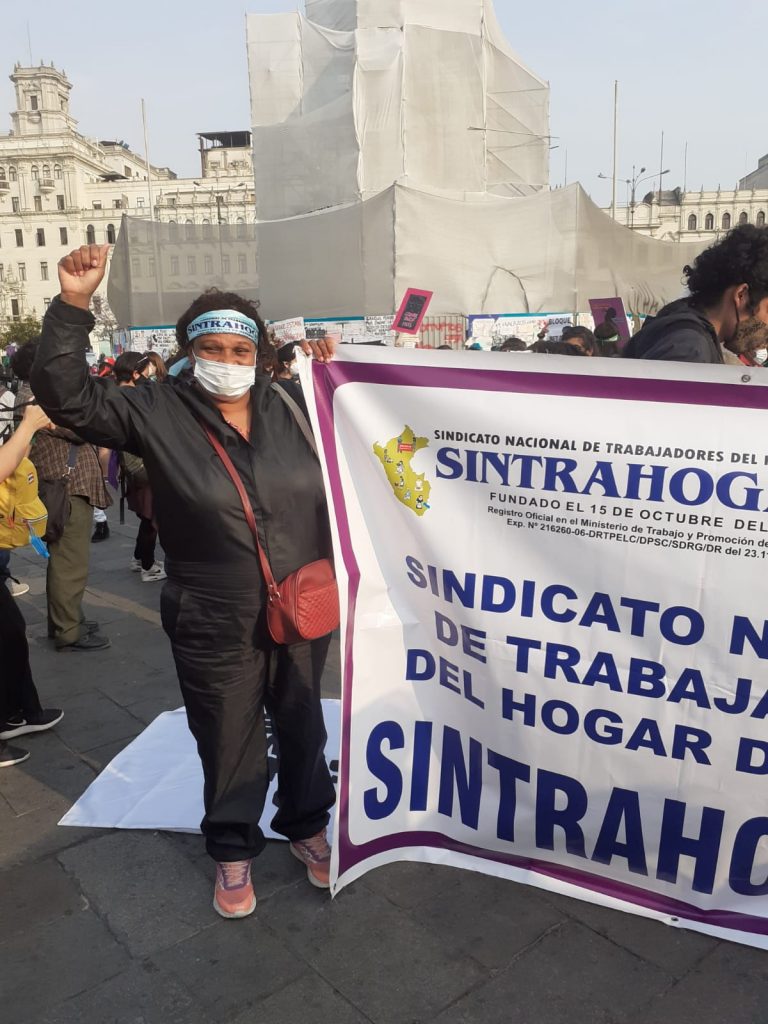
Peruvian domestic workers protest for the ratification of ratification of the OIT’s Convention 190 against violence and abuse of workers. (Photo Courtesy: FENTRAHOGARP)
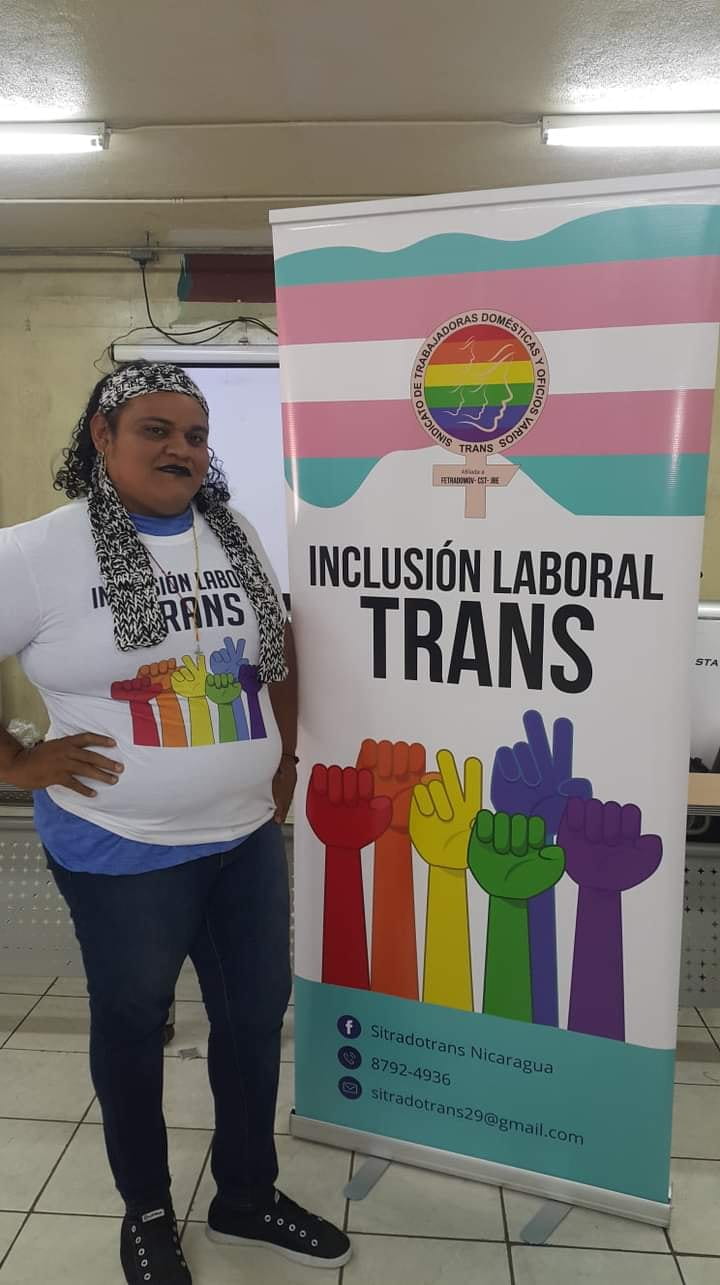
In Nicaragua, FETRADOMOV lobbied intensely for the inclusion of transgender and LGBTQ domestic workers in the worker pool. (Cortesía de FETRADOMOV)

The pandemic did not impede Paraguayan domestic workers during the International Women’s Day. They went out to protest against gender violence and implore the urgent ratification of Convention 190.(Photo Courtesy: SINTRADESPY)
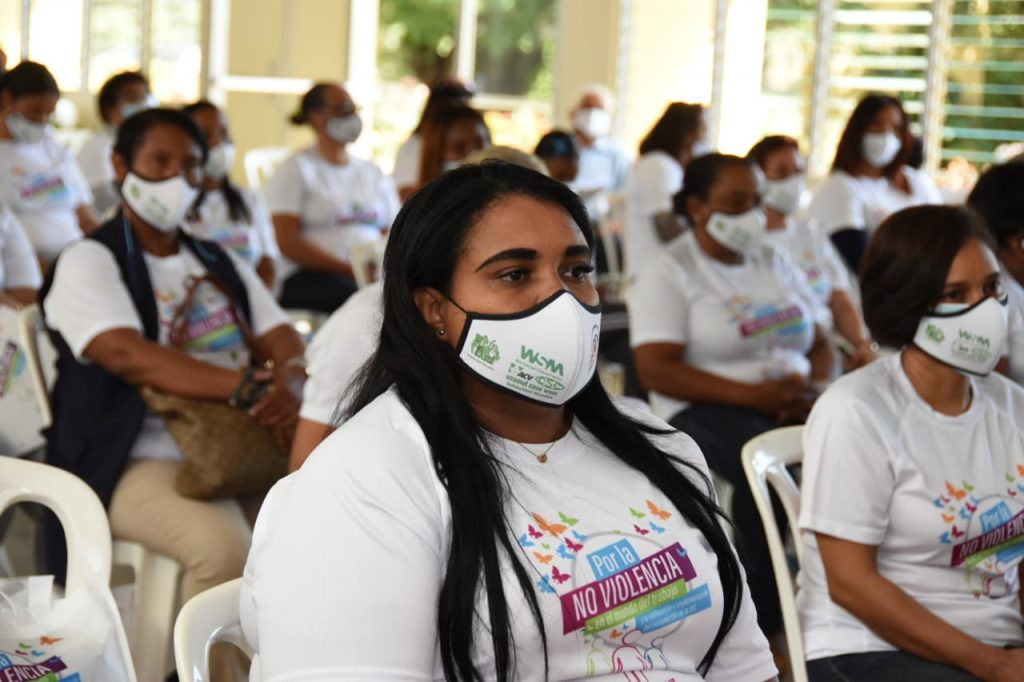
In honor of International Women’s Day, Dominicans affiliated with SINTRADOMES-CASC were taught about gender violence and worker abuse. (Photo Courtesy: SINTRADOMES-CASC)
And there is more. Since March 2020, national and international awards and distinctions have rained down for Latin American organizations of domestic workers and their leaders for their actions in favor of human and women’s rights. Institutions and organizations worldwide also chose our leaders to lead awareness campaigns related to the pandemic and were called “star” speakers at frontline workers’ events globally.
The election of several regional domestic workers leaders to occupy strategic positions in the trade union centers to which their organizations belong deserves a special mention as leaders gained a presence in traditionally male-dominated spaces. And a round of applause for the IDWF regional representative, Andrea Morales, for her new position as a national deputy in Nicaragua, and the Chilean leader Luz Vidal, recently appointed Undersecretary for Women and Gender Equity by Chile’s federal government.
We could not hug each other in two years, as we Latinas, like so many people. But even under the “new normal,” we were close, strong and united. From the IDWF, we worked side by side with our affiliates. We developed a Guide to Health and Safety at Work against Covid-19, collectively built a Toolkit for the Implementation of Convention 189, carried out a collaborative survey to collect information on the effects of the pandemic and designed strategies based on the results (systematized in a policy brief that travelled the world). We supported their actions, involving them in new projects and contributing our grain of sand to alleviate the hunger of many of them and their children. We worked very hard, yes, but we grew and prospered. The satisfactions exceed the effort.
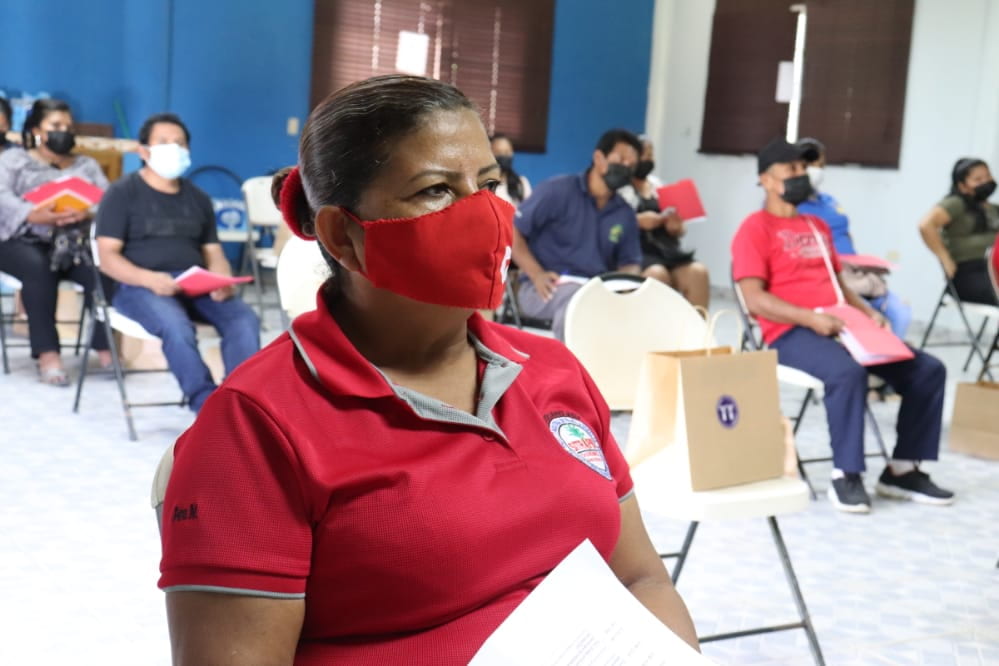
Panamanian domestic workers receive certification on Health and Ocupacional Safety during COVID-19 as a result of a cooperation between SINGRETRADS and the OPS. (Cortesía de SINGRETRADS).
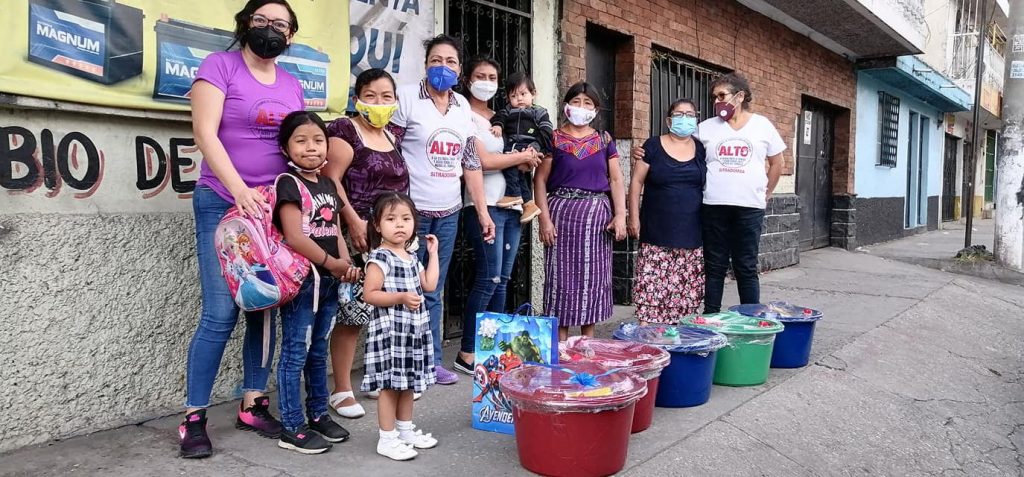
In Guatemala, SITRADOMSA, with the help of the FITH, provides humanitarian aid to its members in moments of public health crisis and unemployment. (Photo Courtesy SITRADOMSA).
Looking to the future
The Covid-19 crisis has shown the terrible lack of protection that domestic workers in Latin America and the Caribbean suffer, but it has also shown that without them, our societies collapse. There is only one way to repair such a contradiction: the Latin American states need to recognize domestic work as work and guarantee it is carried out in decent conditions, equal to those of other salaried sectors.
I wanted to be part of the IDWF to accompany domestic workers in their fight for decent work and social justice. Only from inside an international organization committed to the core of the sector’s demands can a fight be fought. From a distance, it doesn’t work. And seeing my dear leaders in action during the pandemic has left me with the most valuable lesson of my entire life: it can be done; it can always be done!
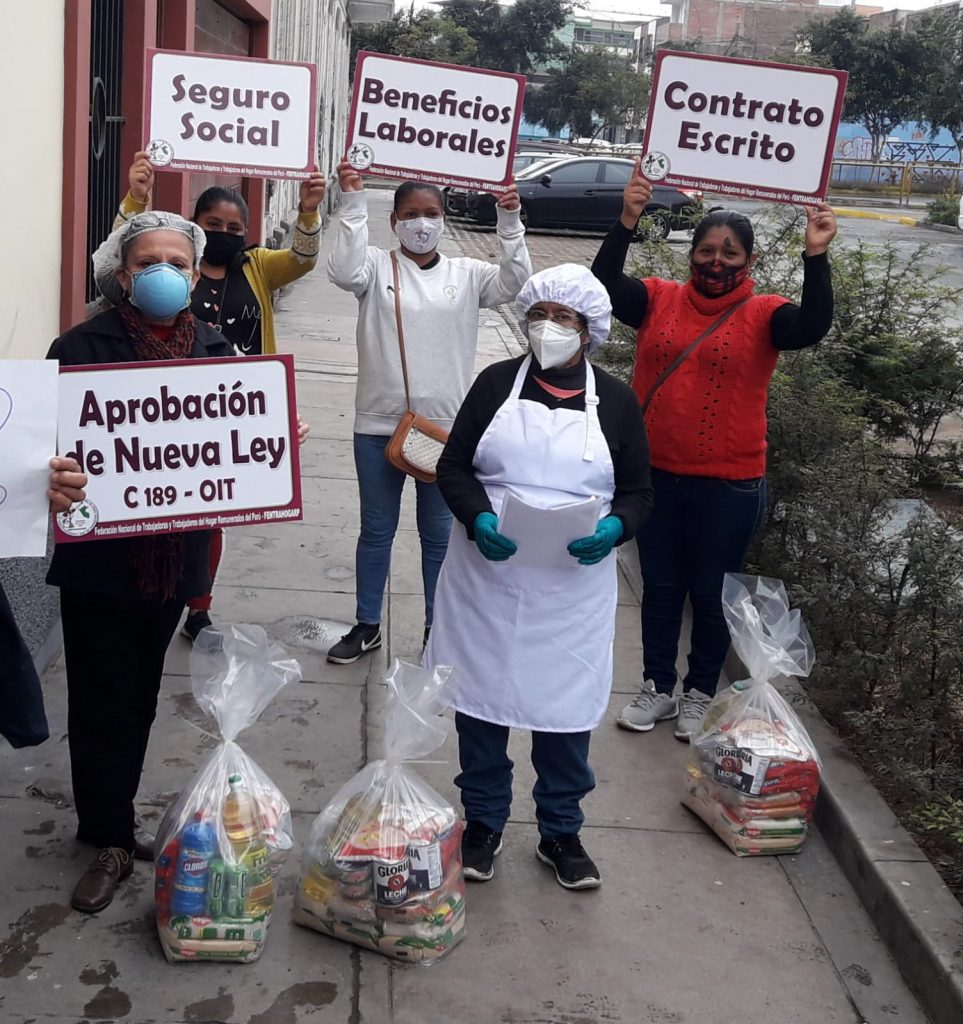
Peruvian domestic workers provide aid to their compatriots and demand the passing of a law for the sector. (Photo Courtesy CCTH).

During the International Day for the Elimination of Violence against Women, Peruvian domestic workers demonstrate their dedication to gender-based causes.(Photo Courtesy: IPROFOTH)
Fernanda Valienti is Program Officer for Latin America at the International Federation of Domestic Workers (IDWF). She is Argentine, mother of Dante, Bachelor of Social Communication, translator, literary editor and writer. She made contact with the union world in 2003, as coordinator of the literary workshops of the Light and Power Union, in Buenos Aires. From then on, she was forever committed to the rights of working people. In 2017, she became involved with the domestic workers’ movement, where she found a second family and professional fulfilment.
Source: Let’s Talk about Resilience – The Pandemic and Domestic Workers in Latin America and the Caribbean
